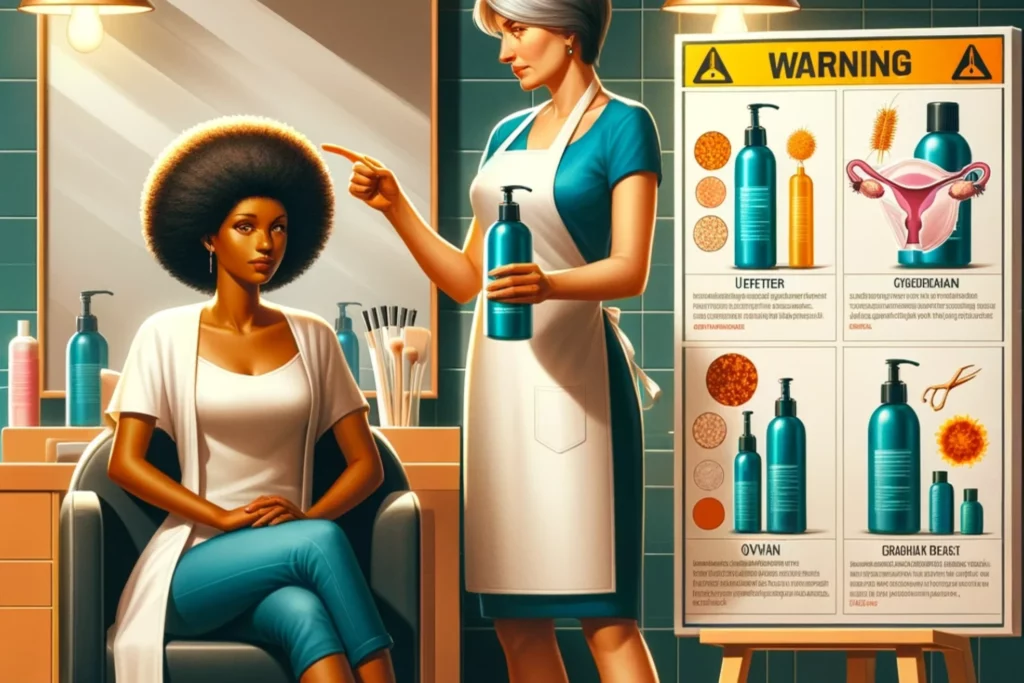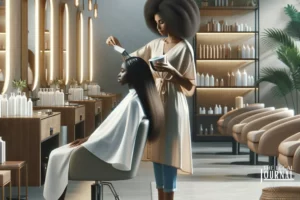The Hidden Dangers of Hair Straightening Products: A Health Perspective
In the quest for beauty and perfection, millions of women turn to hair-straightening treatments and products. However, recent studies have raised alarming concerns about the potential health risks associated with these popular beauty aids.
Key Points:
- Health Risks Identified: Recent studies have linked chemicals in hair-straightening products, particularly those used in salon-based keratin treatments and over-the-counter relaxers, to an increased risk of several types of cancer, including uterine, ovarian, and breast cancer.
- Chemicals of Concern: Formaldehyde, found in many salon treatments, and endocrine disruptors such as phthalates, phenols, and parabens in some store-bought products, are identified as the primary chemicals of concern. These substances can mimic or interfere with hormonal functions, potentially leading to increased cancer risks.
- Impact on Specific Demographics: Hair straighteners and relaxers are often used by and marketed to Black women and other women of color, highlighting a significant health disparity issue and raising questions about beauty standards and racial health inequities.
- Scientific Evidence and Industry Response: Studies indicate a strong association between the use of these products and increased cancer risks, but do not conclusively prove causation. The beauty industry, regulated by the FDA, points out perceived flaws in these studies, even as it faces thousands of lawsuits alleging failure to warn consumers about potential risks.
- Consumer Awareness and Legal Action: The FDA is considering stricter regulations, including a proposed ban on formaldehyde in hair products. Consumers are advised to be cautious and use resources like the Environmental Working Group to identify safer products. The surge in lawsuits reflects growing legal scrutiny and public concern over the safety of these beauty products.
Research has increasingly linked the chemicals in some hair-straightening products to a heightened risk of several types of cancer, including uterine, ovarian, and breast cancer. The U.S. Food and Drug Administration (FDA) is particularly concerned about formaldehyde, a common ingredient in salon-based keratin treatments. This compound has been connected to various cancers, prompting the FDA to consider a ban on its use in hair smoothing products.
The worry doesn’t end in professional salons. Over-the-counter hair straighteners and relaxers may not contain formaldehyde, but they often include endocrine-disrupting chemicals like phthalates, phenols, and parabens. These substances can mimic or interfere with the body’s hormones, potentially increasing cancer risks. According to Dale Sandler, chief of the National Institute of Environmental Health Sciences epidemiology branch, these endocrine disruptors are a significant concern.
A notable aspect of this issue is the demographic most affected. Hair straighteners and relaxers are predominantly used and marketed to Black women and other women of color. This raises critical questions about the intersection of beauty standards, race, and health risks.
The Evidence from Studies
- A 2022 study in the Journal of the National Cancer Institute found that women who used hair-straightening products four or more times a year had more than double the risk of developing uterine cancer compared to non-users.
- Research in Environmental Research in October showed that regular use of hair straighteners by postmenopausal women led to a 50% to 70% increased risk of uterine cancer.
- Separate studies in 2021 linked the frequent use of hair straighteners and relaxers during adolescence to an increased risk of breast cancer and ovarian cancer.
Despite these findings, researchers like Tamarra James-Todd from Harvard T.H. Chan School of Public Health emphasize that these studies show an association rather than a direct cause-and-effect relationship.
The Personal Care Products Council, representing the industry, insists on the regulated nature of these products by the FDA. They acknowledge recent research findings but also point out perceived flaws in these studies.
For consumers, awareness and caution are key. Products marketed as “formaldehyde-free” might still release this chemical under heat. The FDA advises vigilance regarding ingredients like formalin and methylene glycol. Additionally, organizations like the Environmental Working Group and the Silent Spring Institute offer resources to help consumers make safer choices.
The FDA’s regulation of hair straighteners as cosmetics, not drugs, means these products undergo less rigorous safety testing. This regulatory gap has led to a surge in lawsuits. Over 7,000 lawsuits have been consolidated in federal court in Illinois, with plaintiffs accusing companies like L’Oréal and Revlon of selling harmful products without adequate warnings.
The emerging research on the potential health risks of hair-straightening products presents a complex and concerning picture. It underscores the need for more stringent regulation and greater consumer awareness. As we navigate the fine line between beauty and health, it’s vital to remain informed and vigilant about the products we use.
Sources:
- The Wall Street Journal, “Using Keratin Treatments or Hair-Straightening Creams? Research Suggests Potential Cancer Risk,” by Sumathi Reddy, Dec. 4, 2023.
- FDA Reports on Formaldehyde in Hair Products.
- National Institute of Environmental Health Sciences Studies.
- Personal Care Products Council Statements.
- Environmental Working Group and Silent Spring Institute Resources.






